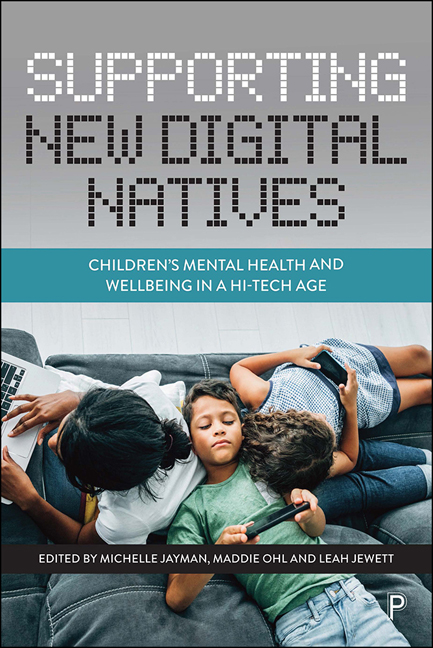Book contents
- Frontmatter
- Dedication
- Contents
- List of figures and tables
- Glossary
- Notes on contributors
- Foreword
- Preface
- 1 Digital lives: growing up in a hi-tech world and staying mentally healthy
- 2 Pyramid Club: building skills for healthy friendships and relationships in a digital age
- 3 Supporting children’s healthy socio-emotional development through play: Book of Beasties – the mental wellness card game
- 4 The School Counselling Partnership: providing support and promoting self-care for school communities
- 5 The Breeze Project: supporting children and young people through Forest School
- 6 Promoting the mental health of girls and young women in the community: the role of Girlguiding
- 7 Supporting families to navigate the changing sex-education landscape: Outspoken Sex Ed
- 8 The Lift Off programme by Red Balloon: online learning and wellbeing support for children who self-exclude from school
- 9 The LifeMosaic project: supporting wellbeing and empowering pupils through design, development and research
- 10 Building better mental wellbeing for children: rebel thinking and innovative practice
- Index
Preface
Published online by Cambridge University Press: 13 May 2022
- Frontmatter
- Dedication
- Contents
- List of figures and tables
- Glossary
- Notes on contributors
- Foreword
- Preface
- 1 Digital lives: growing up in a hi-tech world and staying mentally healthy
- 2 Pyramid Club: building skills for healthy friendships and relationships in a digital age
- 3 Supporting children’s healthy socio-emotional development through play: Book of Beasties – the mental wellness card game
- 4 The School Counselling Partnership: providing support and promoting self-care for school communities
- 5 The Breeze Project: supporting children and young people through Forest School
- 6 Promoting the mental health of girls and young women in the community: the role of Girlguiding
- 7 Supporting families to navigate the changing sex-education landscape: Outspoken Sex Ed
- 8 The Lift Off programme by Red Balloon: online learning and wellbeing support for children who self-exclude from school
- 9 The LifeMosaic project: supporting wellbeing and empowering pupils through design, development and research
- 10 Building better mental wellbeing for children: rebel thinking and innovative practice
- Index
Summary
2020 was an extraordinary year. The global health crisis declared by the World Health Organization (WHO) in March in the wake of the COVID-19 pandemic heralded exponential change to our everyday lives with profound and devastating consequences for individuals, families, communities and nations worldwide. Unquestionably, with millions of cases and hundreds of thousands of mortalities across the globe, immediate attention was firmly focused on tackling the physical burden of the disease and stemming its tidal spread. As we continue to learn to live in the aftermath and adjust to a reshaped normality, the deleterious impact of the pandemic on our mental health and wellbeing is becoming increasingly evident. Some of us have been more directly affected by the virus than others, and likewise our capacity to maintain good mental wellbeing is uniquely related to our individual circumstances. The frequent refrain with respect to the pandemic: ‘We are not all in the same boat. We are all in the same storm’ rings poignantly true. There is indeed a clear divergence of experiences across different ages, geographies and individual circumstances. Children and young people (CYP) are at higher risk of developing mental health problems – for many their mental wellbeing has deteriorated substantially during the pandemic, and increased rates of anxiety and depression are likely to persist for some time to come.
However, it is crucial for us to understand how the effects of the pandemic interplay with the longer-term trend in CYP's declining wellbeing: the original impetus behind this book. The authors are primarily concerned with CYP growing up in the early decades of the 21st century and how to support this unique generation to maintain mentally healthy lives. While the case studies presented here originate in the UK, the voices and experiences they represent will resonate across geographical borders.
Pre-coronavirus, there was an escalating mental health crisis – estimates at the start of the decade placed the percentage of CYP worldwide experiencing mental health difficulties in the region of 10 to 20 per cent. Furthermore, compared to our European neighbours, the UK performed particularly poorly on children's subjective wellbeing, with the nation's 15-year-olds reporting to be the saddest and least satisfied with their lives. These findings present a snapshot of life in 2017–18 and reflect children's mental wellbeing before the 2020 pandemic hit – the subsequent full and longer-term implications are, of course, still unravelling.
- Type
- Chapter
- Information
- Supporting New Digital NativesChildren's Mental Health and Wellbeing in a Hi-Tech Age, pp. xxviii - xxxiiPublisher: Bristol University PressPrint publication year: 2021



